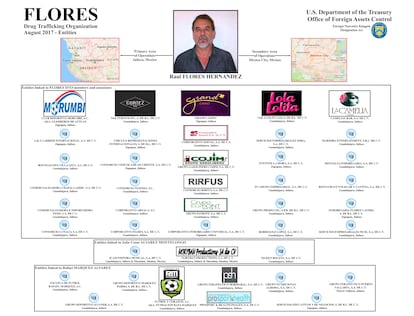Raúl Flores, ‘El Tío’, the discreet cartel kingpin who left no trace
The 71-year-old drug trafficker, who for years worked under the protection of Joaquín ‘El Chapo’ Guzmán, has been sentenced to 22 years in prison in the US

Raul Flores, alias “El Tío,” was arrested in an operation by government agents in Zapopan, Jalisco, on July 20, 2017. But there was no word of his detention until nearly three weeks later. Discreet and methodical, Flores was a virtually unknown cartel capo until August 9, when the U.S. Treasury Department dropped a bombshell, accusing former Mexico international soccer player Rafa Márquez and singer Julión Álvarez of being his front men and including them on the so-called U.S. blacklist. Washington’s decision placed Márquez’s participation in the 2018 FIFA World Cup in Russia in doubt and forced Álvarez, one of Mexico’s most famous artists, to remove his material from platforms such as YouTube, Spotify and Apple Music. Media coverage focused on them among 22 suspects cited by the authorities, until both had cleared their names: the former FC Barcelona defender was acquitted by the Mexican judiciary in early 2018 and by U.S. justice in 2021, while Álvarez was redeemed in 2022 and was able to return to perform on the other side of the border last year. Away from the spotlight, Flores was not as fortunate. He battled for four years until he was extradited to the U.S. and was sentenced last Friday to 21 years and 10 months in prison for cocaine trafficking.
The sanctions imposed by the U.S. Treasury uncovered an extensive network used to launder money: 21 Mexican citizens and 42 companies were singled out by Washington, including family members and close associates. Flores’ empire of front companies included a famous casino in the Guadalajara metropolitan area, a second division soccer team, restaurants, bars, and companies linked to the music industry, health services and tourism. It was the result of over 30 years of work between legal and illegal businesses, and the fruit of countless relationships with the country’s de facto and political powers that allowed him to walk the streets unescorted and at ease. The United States estimates his earnings over the years at hundreds of millions of dollars. The judge who sentenced him last week in Washington D.C. ordered him to pay back an estimated $280 million.
El Tío, 71, came to the attention of drug traffickers in the 1980s, when he constructed a sophisticated network that imported fayuca from the United States, the name in Mexico for U.S. products that were not available in the country and were brought across the border without going through customs checks, according to the court filing. Flores imported clothing, watches, and electronic items in cargo trucks that traveled thousands of miles before reaching end consumers. In 1983, a Colombian cartel capo saw potential in the business and introduced Flores to Joaquín “El Chapo” Guzmán, according to court documents accessed by this newspaper. The Sinaloa Cartel leader took him in and from then on, the flow of merchandise changed radically: Flores stopped bringing in fayuca from the north and began transporting cocaine from Mexico to the U.S. border. There, El Chapo smuggled the drugs through tunnels to cover the demand of the vast U.S. market.
Little by little, he gained the trust of his boss, who introduced him to other drug lords including Arturo and Héctor Beltrán Leyva — at the time El Chapo’s allies and later his enemies — and entrusted him with transporting the profits back to Mexico. By the late 1980s, Flores was already investing in his own cocaine shipments and became Guzmán’s direct emissary with other drug traffickers. Step by step, he came to understand how the business changed, first moving the drugs by plane and, by the 2000s, by sea. El Tío’s contacts extended throughout South America: he received shipments from Brazil, Peru, Bolivia and Colombia.
At the peak of his operations, Flores was importing two tons of cocaine a week into Mexico. Not only did he know the logistics, he also had good relations with high-ranking police and military officials. Getting the drugs to the U.S. was not a problem: in a matter of days, he would send more than half of what he received north of the border, according to authorities. “He used extraordinary methods to cover up shipments, paid bribes to facilitate his cocaine trafficking activities, used non-commercial aircraft to transport cocaine, and laundered substantial profits that he collected through his network of businesses and laundering professionals,” reads a brief filed by prosecutors. The trail of dirty money delivered by Flores included high-level officials from the now-defunct Federal Attorney General’s Office (PGR), to port chiefs and operators at Mexico City International Airport.

Amassing experience over the years, El Tío established himself as an independent trafficker and expanded his connections with other criminal organizations, under the protection of El Chapo. He again interpreted the signs of change and began working with the Jalisco New Generation Cartel (CJNG), when the group became the Sinaloa Cartel’s enemy and took control of Jalisco, the state where he lived and where he was “a recognized businessman,” according to the Attorney General’s Office. He also worked with the Milenio Cartel, a direct predecessor of the CJNG that was allied with Sinaloa, and with the organization of Rafael Caro Quintero, the boss of bosses.
In between, Flores had a brief foray into politics, paying for the local office campaigns of family members and associates. In 2013, he was arrested in Mexico, but was released from prison just two years later. He soon returned to the business from connections he had made while serving his sentence. His lawyers argue that he did so out of necessity and when all doors to make money legally had been closed to him. He was arrested four years later in an operation by the PGR, the agency he paid for protection, according to court records.
In 2021, Flores finally sat in the dock in the United States, under the threat of “overwhelming evidence” against him, including testimony from his former associates, recordings of his criminal activities, and wiretaps. Always low profile, El Tío rejected a jury trial to avoid the media spotlight and pleaded guilty in March last year to the only charge against him: conspiracy to distribute at least five kilograms of cocaine (the minimum to be considered a felony).
Despite the admission of guilt, the prosecution and Flores could not agree on key issues in the case. El Tío and his lawyers argued that he was a mere middleman and claimed that the U.S. authorities were exaggerating when they described him as a big-time kingpin. In addition, the defendant argued that while he had been involved in cocaine trafficking, he had not trafficked more than 450 kilos during his criminal career. Prosecutors attributed more than 120,000 kilos to his activities.
Flores said he was willing to cooperate and attempted to cut a deal, but agents never viewed him as a reliable source: they accused him of fabricating evidence in the judicial process and intimidating witnesses in court. When one person was testifying against him on the stand, El Tío stuck out his tongue as a gesture to stop him from saying too much. His lawyers said it was all a misunderstanding: that he had a nervous tic he could not control.
Flores’ defense claimed that their client suffered harassment in prison, that he was beaten by his cellmate, and that his advanced age merited the minimum sentence of 10 years. They also said the testimonies against him were “an amalgam of falsehoods.” On the opposite end of the spectrum, the prosecution claimed that life imprisonment was a “reasonable, appropriate and commensurate punishment for the gravity of his crime” and demanded that $680 million in drub proceeds be forfeited.
“For more than three decades, Raul Flores-Hernandez worked with the leaders of the world’s largest, most violent cartels,” read the U.S. Justice Department’s statement. In just a handful of hearings that went unnoticed, the case of El Tío, the capo who left no trace, brought to light the use of soccer player transfers for money laundering, methods of drug trafficking on trains, boats and planes, and some glimpses of the complex network of political, business and criminal contacts that allowed him to amass a fortune. But the case, which dragged on for more than six years, was just that: barely a brushstroke. In the end, the sentence was handed down, as was his arrest and the whole legal process, in a discreet manner. As he wanted, as he has always managed to ensure.
Sign up for our weekly newsletter to get more English-language news coverage from EL PAÍS USA Edition
Tu suscripción se está usando en otro dispositivo
¿Quieres añadir otro usuario a tu suscripción?
Si continúas leyendo en este dispositivo, no se podrá leer en el otro.
FlechaTu suscripción se está usando en otro dispositivo y solo puedes acceder a EL PAÍS desde un dispositivo a la vez.
Si quieres compartir tu cuenta, cambia tu suscripción a la modalidad Premium, así podrás añadir otro usuario. Cada uno accederá con su propia cuenta de email, lo que os permitirá personalizar vuestra experiencia en EL PAÍS.
¿Tienes una suscripción de empresa? Accede aquí para contratar más cuentas.
En el caso de no saber quién está usando tu cuenta, te recomendamos cambiar tu contraseña aquí.
Si decides continuar compartiendo tu cuenta, este mensaje se mostrará en tu dispositivo y en el de la otra persona que está usando tu cuenta de forma indefinida, afectando a tu experiencia de lectura. Puedes consultar aquí los términos y condiciones de la suscripción digital.









































